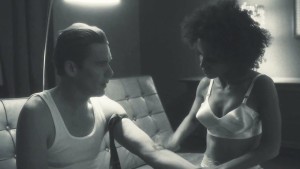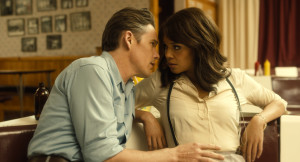The very image of the dope-addled West Coast jazz cat undone by his vices, his biography is full of, shall we say, “incident.” Still, there’s a lingering sense of either lost promise or also-ran status that separates him from the usual towering figures we find in such films. Baker was never, musically or in terms of influence, on the groundbreaking level of a Miles Davis (soon to be profiled in Don Cheadle’s similarly long-awaited but just-released Miles Ahead) or, outside of jazz, a Hank Williams (currently being run through the critical wringer in I Saw The Light).
Born To Be Blue, Robert Budreau’s telling of Baker’s tale, with an impressive Ethan Hawke in the lead, seems eager to acknowledge this, and so aims at something a little different – a musician biopic that’s occasionally contemptuous of its own genre, fully aware of the cliches in which they traffic, though full of respect for the highs and lows of artistic creation itself. It stumbles here and there, like some sort of junkie, but by and large succeeds on its own terms.
As to those “incidents.” This is a guy who was locked up for a year and a half in an Italian jail, expelled from multiple countries for a litany of reasons, beaten close to death by drug dealing goons who he owed money to, experienced a meteoric rise to heartthrob status and an equally precipitous fall, only to rise again (after getting all his teeth replaced after the beating) as a weirdo crooner who, with a distinctively aching, almost-flat cadence, made jazz standards his own. There are seemingly countless stories to tell. Wisely, Born To Be Blue only tells a few of them, and does so, at least in the early going, in an impressionistic fashion that recalls Todd Haynes’ I’m Not There.
The film opens with a bit of cinematic sleight-of-hand: we watch Baker’s first performance at Birdland, with a dismissive Miles Davis and Dizzy Gillespie in attendance, followed by his first foray into heroin as he cheats on his partner.
But it’s artifice, a re-creation: we’re actually watching Baker re-enact those same events for an ill-fated (and actually attempted) biopic a decade after they transpired. It’s a wink from Budreau, and an effectively startling tweak on the formula. Baker, the film seems to say, is and will always be fractured through the ways in which his story is told. All the themes are announced from out of the gate: the anxiety of influence, a desire to impress those he knows in his heart are better than him at the only thing he’s good at and a sorrow that he can’t, drugs, sex, and illusion. It’s a bold and clever stroke.
The film returns to such devices several times, but they become fewer as it progresses – too bad, since they are its most unique aspect. Instead, we mostly focus on a few years in the late 60s, as Baker falls in love with Jane (Carmen Ejogo, captivating but only as relevant to the story as the script lets her be), tries to get clean, fails, gets his face kicked in, works to mount a comeback, and succeeds, with some heroin-related caveats. The conventional biopic pokes its tired head out, despite Budreau’s attempts to keep it at bay.
This would be more of a problem if the chemistry between the leads weren’t so palpable, and if Hawke weren’t so good. His Baker is not just born to be blue, but born to lose. He knows it. Everyone knows it. Part of the film’s courage is that it refuses to divorce his failings from his best attributes. This is not a redemption tale (a fact anyone familiar with the real-life Baker’s colossal and repeated shitbaggery will be pleased to learn). It’s the story of a talented person whose gifts are intertwined with his weaknesses, and who can’t seem to resist a path that is bound to lead him off a cliff.
If you love something, and you’re loved for it, but it also ensures your self-destruction, what do you do? Maybe you give it up, and choose a more pedestrian route, rejecting the thing that makes you special. If you’re Chet Baker, you simply can’t accept that as an option.
In the film’s most memorable scene, here we have a nearly fatally beaten man, out of the hospital, with a full set of dentures from teeth that were kicked completely in, who is advised to not put too much strain on his mouth. He agrees – and promptly sits in a bathtub to try and relearn his instrument, forming visibly torturous embouchures with his lips as blood pours out of the trumpet into the drain.
That’s not a sane thing to do. But some people can’t help themselves.
The “giving it all for your art” motif might sound cloying, but Hawke brings a wounded fragility to the role, as well as a sharp edge of self-absorbed prickishness. It’s a very true performance. He’s brittle and insecure, but he knows this is what he’s here for, and he knows it’s ridiculous, and he knows it’s hurting everyone he loves, and he does it anyway. That’s neither contemptible nor admirable. It’s just how a certain kind of person might behave.
There are plenty of faults to Born To Be Blue: Ejogo, whose Jane is a composite of numerous women, is woefully under-scripted; there are lovely shots of the Pacific Ocean, but much of the cinematography is pretty indifferent; there’s an unfortunate line repetition, and an even more unfortunate slow-clap; the title cards at the end really aren’t needed.
But there is plenty to recommend it, too, for Baker fans and non-fans alike. Budreau aimed to skew the genre – maybe to find a narrative form that echoed both the music itself and the halting, self-sabotaging nature of its subject – and in Hawke found an actor game to play along. Like Baker, it’s captivating, melancholy, uneven, but ultimately lovely and frustrating by turn.



